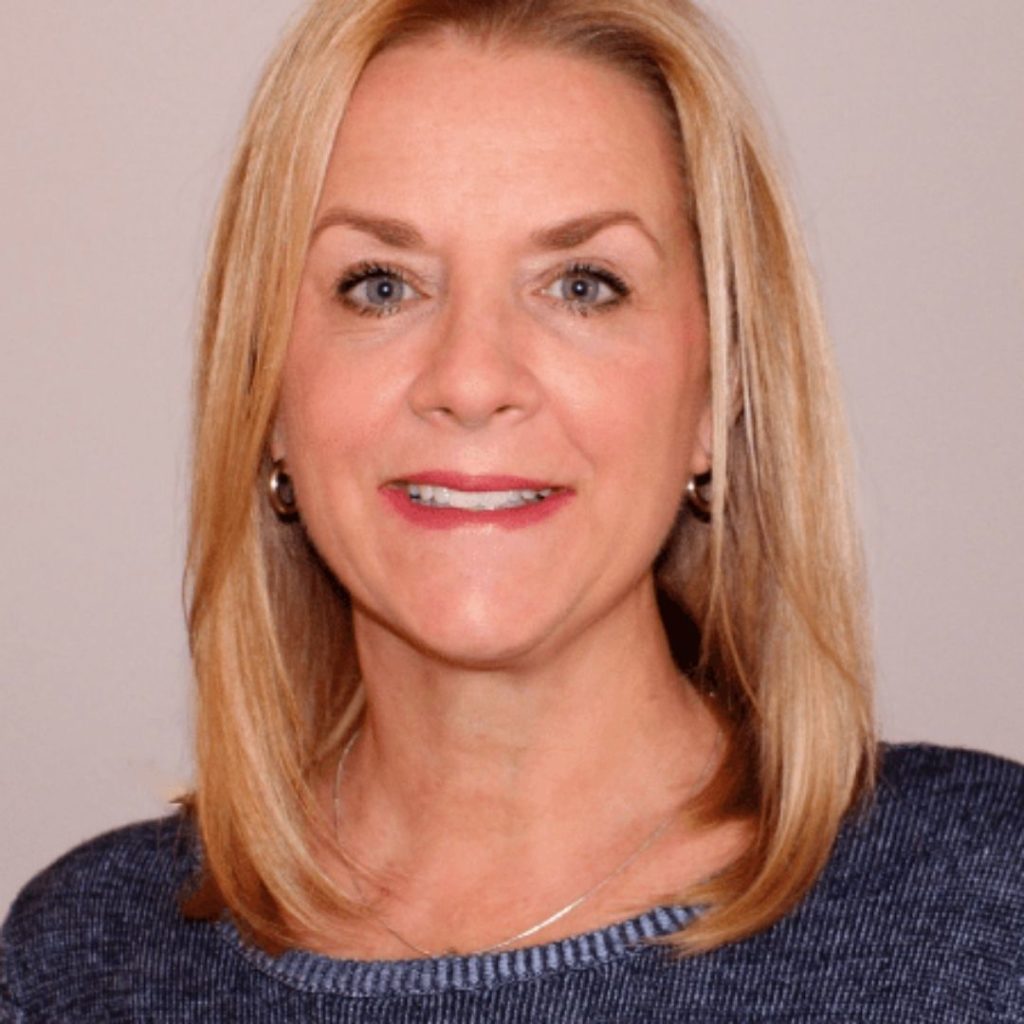“I think when you talk about celiac disease, most people—even within the healthcare community—believe, ‘Well, if you’re not throwing up profusely or having all of these GI symptoms, then you can’t have celiac disease,’ and that just simply isn’t true. And so, I hope to raise awareness of celiac disease, to educate others, and to help people with celiac disease and their families as they navigate not just the healthcare part of their journey but also the gluten-free diet.”
Meet Amy Venetucci (Chicago, Illinois)
When Amy’s daughter stopped growing as a child, she knew something had to be wrong. “In early elementary school, she started having some small things going on with her health where she didn’t feel great all the time, but it wasn’t anything that really raised any huge red flags,” Amy explains. “But as she got a little bit older, she started developing a lot more joint pain and headaches, she was cold quite a bit, and her growth had slowed down. She had always been a petite person, but she kept sliding down that growth chart each year as we would go back in for her annual well visits.”
While initial blood work did not include a test for celiac disease, it shed light on another autoimmune condition. Though Amy expected her daughter to start feeling better with the introduction of a treatment, her daughter’s symptoms worsened instead. Further examination through blood work, a biopsy, and genetic testing revealed celiac disease, and Amy’s daughter started on the gluten-free diet right away.
Transitioning to the gluten-free diet provided a new avenue for Amy to explore in the kitchen, finding new meals, recipes, and favorites for her family to enjoy. “We really try to focus on fresh, home-cooked meals. We eat a lot of fresh produce and protein and nutritious grains like quinoa and things like that. I really like to cook, and I have a lot of fun exploring at the grocery store, so I shop at several different places to find good gluten-free substitutes for things that we used to buy for our family.”
Outside the home, however, finding safe gluten-free meals proves far more challenging. “We don’t eat at restaurants very often—we’re pretty selective about it, and when we do, we try to stick to dedicated gluten-free restaurants,” says Amy. “If we can’t find one that we’re feeling comfortable with and we need to go out as a family for one reason or another, we tend to bring food with us for her. We do a lot of research before we go out, and we choose our travel destinations very, very carefully.”
As Amy’s daughter grows into her teenage years, it brings along new challenges. Now, her daughter must begin to advocate for herself and manage her diet on her own, especially as social opportunities arise. “I think for her, at that age where she is now, she has a bit of reluctance to advocate for herself,” says Amy. “It’s really challenged her to do that, to have to step up and speak up for herself and just demand that she gets what she needs. It’s a hard thing to do, but she’s learning.”
“One of the more recent challenges for her is going out with friends. It’s always been a pretty safe space for us when we eat together as a family, but as she gets into her teenage years, so many social occasions revolve around eating. When she’s not able to choose what those places are and she doesn’t want to call too much attention to herself or be a burden, she sometimes won’t go. She sometimes will go, but chooses not to eat. She doesn’t want to bring her own food when she’s not with us, and in general it increasingly just steals the joy out of going out and being social with friends. It creates a lot of stress and then she’ll stop and evaluate, was it even worth it for me to go?”
Just as Amy’s daughter advocates for herself, Amy hopes to advocate for others with celiac disease and continue to spread awareness. “I actually had had a friend whose children had celiac disease. But I just didn’t know enough about it to have it really be on my own radar as we were trying to figure out what was wrong with my daughter, so I would love to be able to raise a greater awareness of celiac disease and to help people really understand how far-reaching the various symptoms can be.”
As a Reach Beyond Celiac Ambassador, Amy is especially interested in the science side of celiac disease and building the Go Beyond Celiac database. “I know how important it is as Beyond Celiac drives research for a cure that we really build that database so that we’ve got a stronger foundation with information about patients who potentially could contribute to some of these research initiatives. I’d like to be able to help on that front.”
As an advocate, Amy pushes forward celiac disease research; as a mother, she sees the future it could mean for her daughter. “She has complex conditions beyond celiac disease. It’s a pretty heavy load to carry sometimes, and so, if we could remove just one of those pieces from her overall healthcare burden, I think it would lighten her load and give her one less thing to worry about.”
Donate here to support our Ambassador program.



